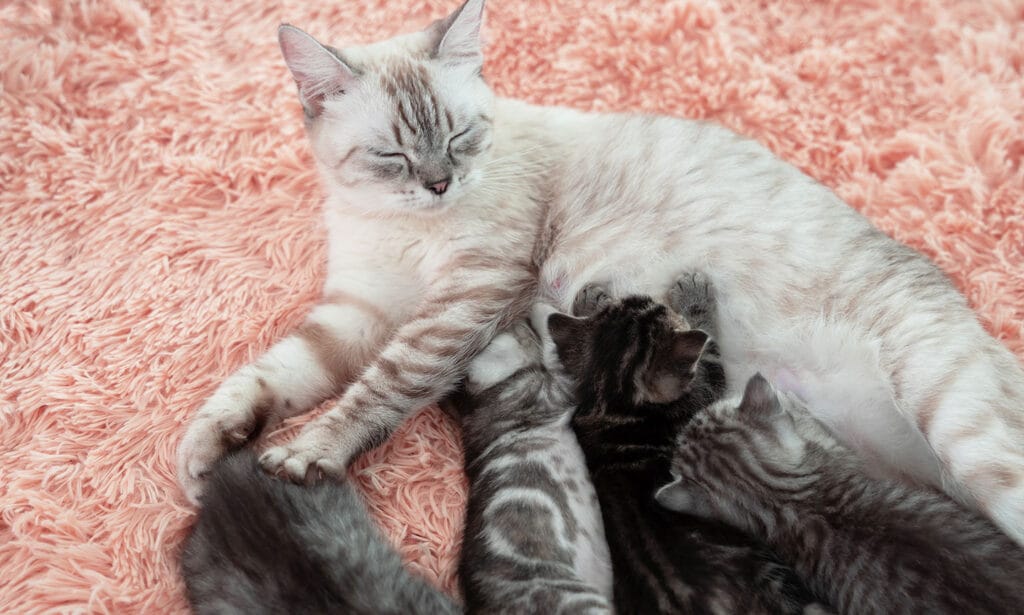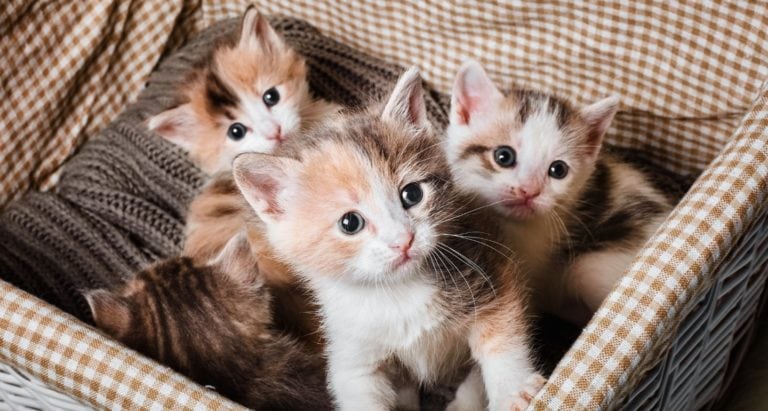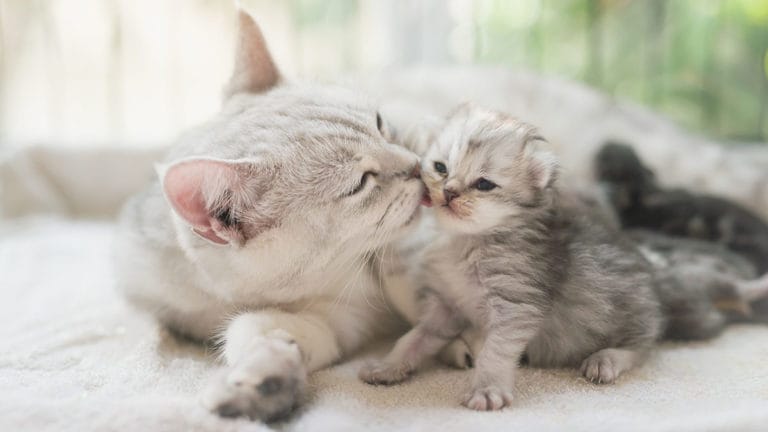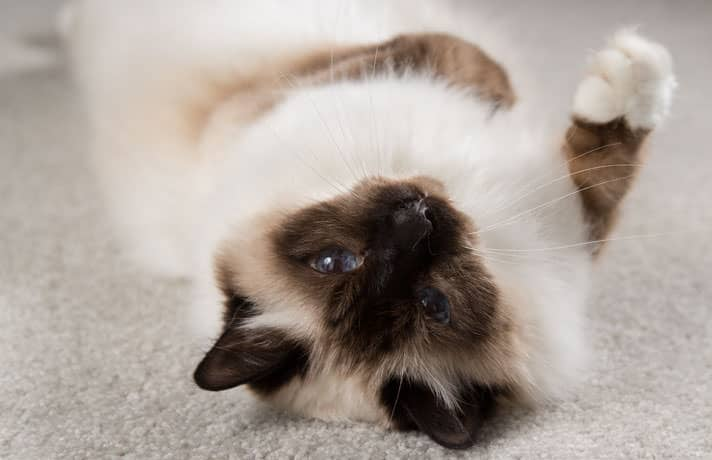Knowing what to expect when your cat is pregnant is critical to making sure they and the litter of kittens remain healthy and comfortable.
This cat pregnancy guide can help answer your most-asked questions, including how long are cats pregnant; how to tell if your cat is pregnant; what signs and symptoms to watch for; and what to do to keep a pregnant cat content and comfortable before and after birth.
When Can Cats Get Pregnant?
Cats can become pregnant when they are in heat, which usually starts around the age of 6 months.
“Cats can reach sexual maturity and mate as young as 4 months of age, but 6 months is more typical for a female cat's first heat cycle,” says Danielle Bernal, BVSc, MRCVS, based in Burlington, Massachusetts.
Cats are usually in heat for about a week, and their heat cycles are influenced by the season, with most cats cycling more frequently (and mating more frequently) in the spring (aka “kitten season”).
If not spayed, “cats can cycle up to every two weeks,” says Kate Farmer, DVM, a veterinarian at the Animal Humane Society in St. Paul, Minnesota.
How To Tell a Cat Is Pregnant
Early signs your cat may be pregnant are often difficult to discern, Dr. Farmer says. “Most people won't pick up on any differences at all,” says Dr. Farmer. That’s why cat pregnancies are often a surprise, she adds.
However, as the pregnancy progresses, you may begin to notice some or all of these signs, according to Dr. Bernal.
- Behavioral changes: Your cat may become more friendly or show increased affection. You may also notice nesting behavior (seeking out secluded, comfortable areas) or changes in appetite or energy levels.
- Physical changes: Weight gain, a growing belly, enlarged mammary glands and pinkish nipples are all physical signs your cat might be pregnant, but these typically don’t develop until the later stages of gestation.
- Milk production: Closer to the birth of kittens, you might also notice milk leaking from your cat’s nipples.
If you think your cat might be pregnant, Dr. Farmer says your vet can run some diagnostic tests, such as:
- Manual examination: Vets can typically feel for kittens in the belly of cats around two to three weeks pregnant.
- Ultrasound: Ultrasounds generally pick up kitten heartbeats at roughly three to four weeks gestation.
- X-ray: X-rays can show skeletons of kittens by about six weeks into a cat’s pregnancy.
A hormonal pregnancy test via blood draw can be administered 28 days or more after mating, says Dr. Bernal. However, due to the subtle signs of early pregnancy in cats, you may not even know to ask for one, which is why most cat pregnancies are confirmed through examination, adds Dr. Farmer.
How Long Are Cats Pregnant For?
The gestation period for cats is typically 63-65 days or just over two months, says Dr. Farmer.
Cat Pregnancy Stages
While cats have a much shorter gestation period than humans, it may be helpful to think of your cat’s pregnancy in three trimesters or stages, says Dr. Bernal.
Early Stages (Weeks 1-4)
“Cats are known as induced ovulators, meaning they do not ovulate and release an egg until the physical act of mating has occurred,” says Dr. Bernal.
From there, during these first few weeks, one or several fertilized eggs implant in the uterus to develop rapidly into an embryo. “There might be some subtle behavioral changes, but external signs of pregnancy are not yet visible,” she adds.
Toward the end of this stage, at roughly four weeks, your vet may be able to pick up fetal heartbeats via an ultrasound, says Dr. Farmer.
Middle Stages (Weeks 5-7)
By now, your vet should be able to see kitten fetuses using an ultrasound, says Dr. Bernal. This is when you may begin to notice weight gain or a distended stomach in your cat, she says. At roughly six weeks, your vet should see kitten skeletons forming on X-ray, adds Dr. Farmer.
Late Stages (Weeks 8-9)
Kittens gain most of their weight during the last couple of weeks during a cat’s pregnancy, says Dr. Bernal. You may notice differences in your cat’s behavior, such as restlessness or starting to nest before birth.
Just before delivery (roughly 24 hours), the pregnant cat’s body temperature will drop 1-2 degrees, often to below 100 degrees Fahrenheit.
Finally, birth typically comes by day 65 of gestation, and most cats deliver their kittens within a four- to six-hour time frame, she adds.
Signs a Cat Is Going Into Labor
Being aware of cat labor signs will give you peace of mind. However, it’s common to miss these cat labor signs because they can be subtle or go unnoticed if they occur during the night or when the cat is nesting alone.
- Restlessness
- Nesting behavior
- Loss of appetite
- Vocalizations
- Rectal temperature drops
- Abdominal contractions or white discharge
What To Do During Labor
If you suspect your cat is going into labor or will do so within days, make sure she has easy access to her nesting space—whether that’s a spare bedroom or just a quiet comfortable corner—at all times. Your cat could begin the birthing process overnight or when you’re not home.
For that same reason, you’ll want to keep other pets who may be in the home separated from the pregnant cat to reduce stress and avoid potential injuries. “If the cat gives birth and you're not aware, it's hard to know how your other pets will react to the kittens,” says Dr. Farmer.
It may be tempting to intervene in some ways if your cat begins to labor, but “all things considered, cats give birth uneventfully 99.9 percent of the time,” says Dr. Farmer. “It's uncommon to need to do any sort of medical intervention with a cat birth. So my recommendation is just to leave them alone, and let mama do her thing.”
Still, your vet may recommend having some supplies on hand, such as towels, heating pads and kitten formula (in case of feeding complications).
Where Should I Put the Newborn Kittens?
As for where to put newborn kittens, remember to take a “do not disturb” approach and minimize handling of newborn kittens after birth, says Dr. Bernal.
“Let nature take its course, and allow the mother cat to nurse, clean and nurture her young,” she says. The mama cat will also eat the placenta, adds Dr. Farmer.
Keep her and kittens in a safe, warm area away from other pets; the new family will likely just remain in the nesting box, Dr. Farmer says.
Otherwise, it’s a good idea to bring the kittens and mother to the vet for a checkup within a day or so of birth and then again after a few weeks to make sure everyone is doing well.
How To Care for a Pregnant Cat
There are a few things you can do to make sure a pregnant cat is calm and comfortable throughout her pregnancy.
Medical Care
Not only will an initial trip to the vet be able to confirm the pregnancy and—depending on how far along she is—how many kittens your cat is carrying, but this is also when your vet will make recommendations for medical protocols, says Dr. Farmer.
This includes vaccinations your cat may need to protect her and her newborns from disease, and also likely dewormer to get rid of harmful intestinal parasites, adds Dr. Bernal.
Diet
Both Dr. Bernal and Dr. Farmer recommend swapping mama cat’s typical food for high-calorie kitten food.
That’s because “pregnant cats require a high-quality, highly digestible diet rich in protein and essential nutrients to support fetal development,” says Dr. Bernal. “Adjust the feeding slowly over the pregnancy, as the amount of calories and food your cat needs will steadily increase throughout pregnancy.”
Your vet can provide more guidance on the transition.
These vet-recommended diets come highly rated:
Nesting Space
Pregnant cats will look for a nesting area that offers a warm, comfortable environment away from other people, pets and sounds in the home, says Dr. Farmer.
At least four weeks before you predict labor to begin, Dr. Bernal says to create a cozy spot for your cat with an empty cardboard box lined with blankets or towels.
Cat Pregnancy FAQ
Q:
How long do cats stay pregnant?
Q:
How can you tell how far along your cat is?
A:This isn’t something you’ll be able to determine at home—and don't just guess, says Dr. Farmer.
If you suspect your cat is pregnant, your vet will give you an expected gestation timeline and approximate due date based on a series of diagnostic tests, such as stomach palpation, ultrasounds, X-rays or hormonal blood analysis, says Dr. Bernal.
Q:
How do I know when my cat is ready to give birth?
A:Signs a cat is ready to give birth include restlessness, nesting behavior, loss of appetite, vocalizations, temperature drops, and abdominal contractions or white discharge.
“For the most part, cats have very smooth deliveries on their own, and minimal intervention from pet parents is necessary,” says Dr. Bernal. The goal is to minimize handling newborn kittens and “let the mama cat do what comes naturally for her,” she adds.
Once your cat’s pregnancy is behind her and you have kittens wandering around, there are a few things to consider depending on whether you plan to expand your family or find the babies adoptive homes.
Read more about when kittens can be adopted; what to expect during a kitten’s first vet visit; and the best diet to feed kittens for healthy growth.
Expert input provided by Kate Farmer, DVM, a veterinarian at the Animal Humane Society in St. Paul, Minnesota; and Danielle Bernal, BVSc, MRCVS, global veterinarian with Wellness Pet Company in Burlington, Massachusetts.
This content was medically reviewed by Chewy vets.
Learn more about cat reproduction:
Share:












